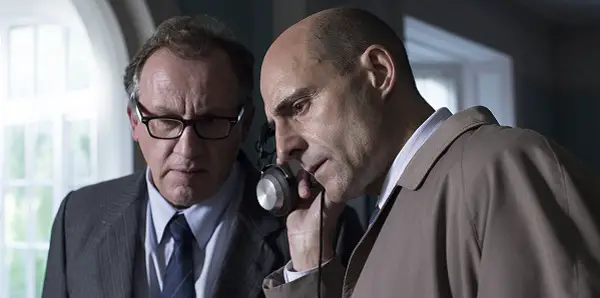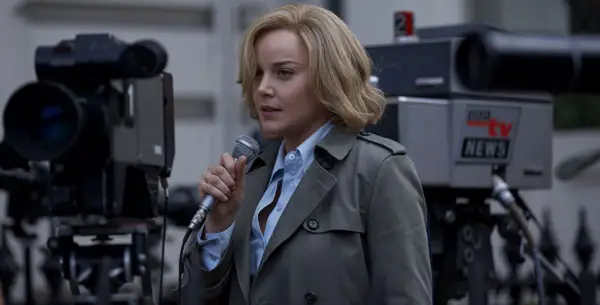6 DAYS: A Tense Hostage Drama That Makes For Uncomfortable Viewing

Lee Jutton has directed short films starring a killer toaster,…
6 Days is a big, boldly waving Union Jack of a film, an awestruck ode to the firepower of the British Special Air Service (SAS), and the stubbornness of a government unwilling to give in to the demands of terrorists. Written by Glenn Standring and directed by Toa Fraser – who previously collaborated on the 2014 Maori revenge drama The Dead Lands – it chronicles the responses of the British government, army, police and media to the Iranian Embassy siege of 1980.
And while 6 Days tells a true story, as opposed to a hackneyed fictional tale designed solely to whip audience members up into a violently ethnocentric fervor against anyone with brown skin and a beard (looking at you, London Has Fallen), one can’t help but wonder whether it was a story that needed to be told again right now, at this moment in history.
Running Out Of Time
The film begins on April 30, 1980, as six armed men storm the Iranian embassy in London and take everyone within it hostage. The men are Iranian Arabs who wish for the Iranian province of Khuzestan, also known as Arabistan, to be liberated from Iranian rule and established as an autonomous Arab state. Before they release their hostages at the embassy, they want all Arab prisoners released from Khuzestan prisons – and once that’s done, they want safe passage for themselves out of the United Kingdom.

Needless to say, the British government isn’t too keen on complying with their demands. Instead, a siege begins that lasts – you guessed it – six days, during which increasingly desperate hostage negotiators attempt to cajole the men into, if not releasing the hostages, at least prolonging their lives. However, as it becomes clear that little progress is being made in granting their demands, the terrorists’ trigger fingers become increasingly itchy.
In the meantime, an SAS squadron starts planning and practicing for what they believe will be the inevitable – an armed raid on the embassy to rescue the hostages. Ambushing the terrorists with guns blazing could be the only way to save the hostages, but it could just as easily lead to their deaths, and the powers that be are running out of time to make a decision to make or break the crisis.
Tension and Testosterone
Testosterone is the order of these 6 Days. Among the ensemble cast, Abbie Cornish has the only major female role in the film. She plays trailblazing BBC reporter Kate Adie, who reported live from the scene of the raid while crouched behind a car and set a new standard for literally on the ground coverage, yet Cornish smothers her natural Australian voice with an almost cartoonishly posh English accent that feels as though it would be better spread across crumpets with clotted cream than coming out of her mouth.

Despite the often inadvertently hilarious tone of her voice, Cornish’s portrayal of Adie as a bold woman who was willing to put herself in danger to get her story feels just as heroic as anything done by the SAS in the film. Said SAS is led by a scrappy and charismatic Jamie Bell as squadron leader Rusty Firmin (the real-life Rusty served as a consultant on the film), while Mark Strong gives a nuanced performance as police negotiator Max Vernon, charged with the delicate, dangerous task of communicating with the increasingly edgy men holding the embassy.
This talented trio of actors manage to do wonders with a script that doesn’t stand out in the slightest. However, one doesn’t watch a film like 6 Days for the dialogue. One watches a film like 6 Days for the intensity and the action, and those are two things the film does quite well. Not being familiar with the story beforehand, I had no idea how the film was going to end, which meant my anxiety levels were shooting through the roof during the entire thing.
Like other based-on-a-true-story thrillers, such as Captain Phillips, 6 Days is not the kind of movie that one goes to see on a Friday evening in the hope of unwinding after a long work week; one should be prepared to spend the next 94 minutes soaking up all of the stress and tension exuded by Bell, Strong, Cornish and company.
But Do We Need 6 Days Right Now?
Watching 6 Days is an uncomfortable experience in more ways than one – but, the primary reason why I was unable to fully enjoy the film had nothing to do with its quality and entirely to do with the current political climate. We live in a world where the President of the United States will rush to ban Muslims from entering the country because of “radical Islamic terrorism” but will hesitate to condemn white nationalists committing acts of domestic terrorism on American soil. Again and again, the news media chooses to depict violent acts around the world through a specific lens, one that demonizes people of color and glorifies the stubbornness of white men who stand their ground while wielding guns.
Yes, the hostage takers at the Iranian Embassy deserved to be stopped from carrying out their mission. Yes, it is heroic that they were stopped before all of the hostages lost their lives. Yes, it was a “raid the world had never seen the likes of.”
But did we really need to see it again? In the hostile, intolerant Britain of Brexit, do we need movies like 6 Days to glamorize the militarization of our world and to glorify the government of Thatcher? Do we need yet another movie starring angry Middle Eastern terrorists, as though that is all people from that part of the world are capable of being? I don’t think we do. And that’s why I truly felt uncomfortable watching 6 Days. I felt as though by watching the film I was being complicit in furthering stereotypes and prejudices that don’t deserve any more screen-time in the 21st century.
What do you think? Is it still worth retelling these episodes of history in our current political climate? Share your thoughts in the comments.
6 Days was released in the UK on August 4, 2017 and in the U.S. on August 18, 2017. For more international release dates, please see here.
Does content like this matter to you?
Become a Member and support film journalism. Unlock access to all of Film Inquiry`s great articles. Join a community of like-minded readers who are passionate about cinema - get access to our private members Network, give back to independent filmmakers, and more.
Lee Jutton has directed short films starring a killer toaster, a killer Christmas tree, and a not-killer leopard. Her writing has appeared in publications such as Film School Rejects, Bitch: A Feminist Response to Pop Culture, Bitch Flicks, TV Fanatic, and Just Press Play. When not watching, making, or writing about films, she can usually be found on Twitter obsessing over soccer, BTS, and her cat.













